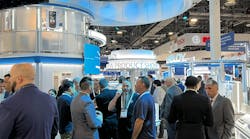CAMPBELL, CALIF. -- Recognition Systems, the biometric component of Ingersoll-Rand's (IR) Security & Safety's Electronic Control Systems, has announced that Aspirus Wausau Hospital in Wausau, Wisconsin is using 50 of its biometric HandReaders to ensure only authorized individuals access hospital grounds. Aspirus Wausau Hospital serves the health care needs of residents of Wausau and a 12-county region of northern and central Wisconsin.
Over 3,000 Aspirus Wausau employees are enrolled with the HandReaders, which automatically take a three-dimensional reading of the size and shape of a hand and verify the user's identity in less than one second. Recognition Systems was named recipient of the 2004 Application Market Penetration Leadership Award for access control and time and attendance applications in Frost & Sullivan's study, World Biometrics Market.
"We chose biometrics because of the high cost of using access control cards," explains Greg Pehlke, security supervisor for the hospital. "We were spending $2,000 a month on smart cards with computer chips, which employees were simply loaning to unauthorized individuals. Much of this cost, and the security breaches, have been eliminated with the HandReaders."
Aspirus Wausau Hospital's previous card-based system had reached full capacity, and it would frequently freeze up. During the transition to biometric access control, the hospital had a dual system running with both card and HandReaders. Now, however, the hospital is using only HandReaders for access control.
The hospital's 50 HandReaders, including rugged outdoor models designed to handle inclement weather, control access to the hospital. The front entrance is locked down after visiting hours and only authorized individuals can enter at that point. The HandReaders are networked and all security systems are monitored from the security department's dispatch center.
Hospital officials have found hand geometry to be more reliable than other biometric technologies they researched, Pehlke emphasized. There are fewer false reads with HandReaders and fingerprint scanners just don't work for large user populations.
The hospital will be adding six new readers this year. More departments are requesting the HandReaders so that they can eliminate keys and increase security, Pehlke said.

